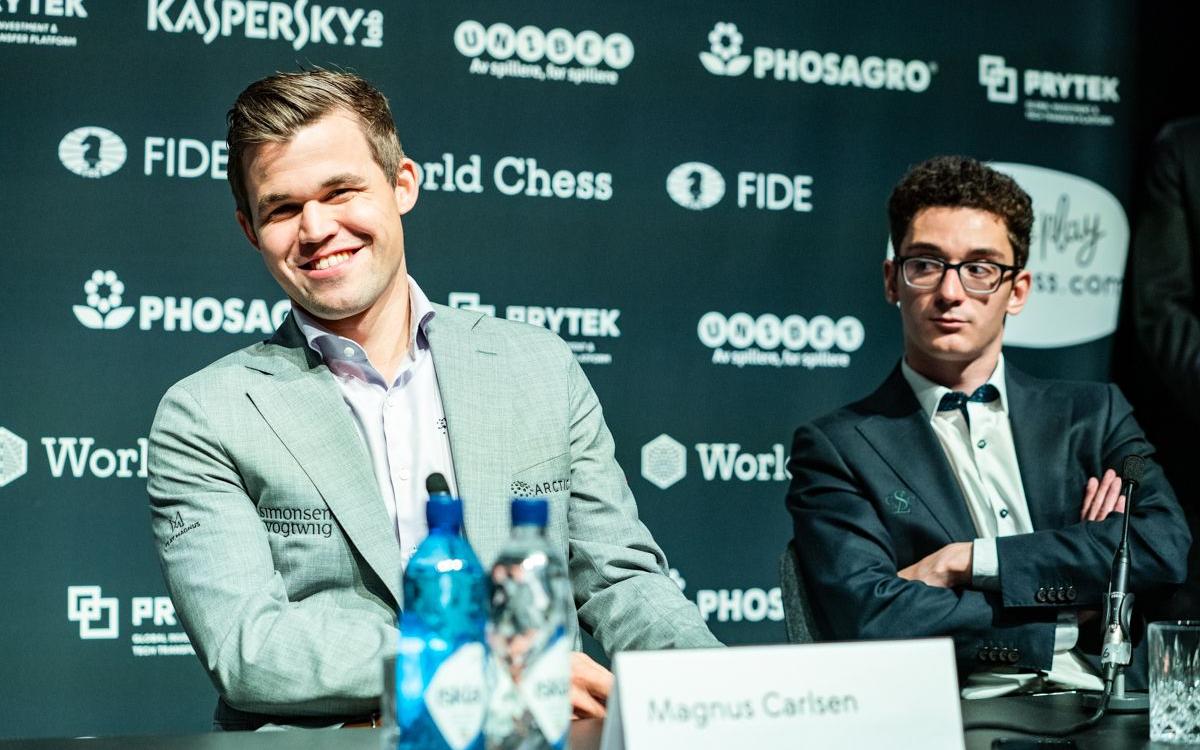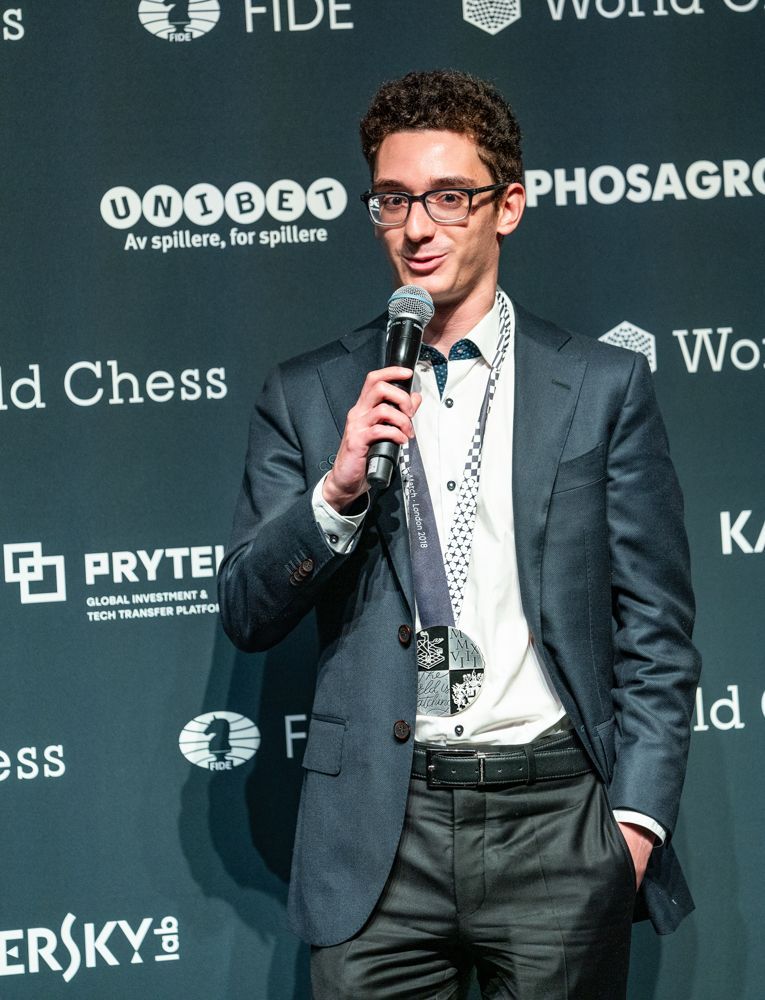
Fabiano Caruana: What Went Wrong?
The world championship match is over and now it is a part of chess history. Just like any big chess event, it has provided a lot of food for thought.
For many chess fans the main takeaway from the match is that something should be changed so we don't have world championship matches where all games are drawn. While I am not particularly happy with 12 straight draws in the classical part of the match, I prefer to concentrate on the games. The readers of my column know that I consider Magnus Carlsen a genius, so it is "mission impossible" to beat him in a match. Nevertheless, Fabiano Caruana was a worthy opponent, and in my opinion was capable of beating Carlsen. So, what went wrong?
It turns out that I was absolutely correct in my preview of the match. I predicted that we wouldn't see the Berlin in the match since Carlsen would go for unbalanced positions, since relying on pure technique didn't work quite well for him against Caruana. Indeed, the world champion chose the Sveshnikov Sicilian that generally leads to a sharp, dynamic play. I think it was a brilliant decision that ultimately decided the fate of the match!
Let me explain my reasoning.

Caruana addressing the audience at the world championship closing ceremony. | Photo: Maria Emelianova/Chess.com.
In a world championship match, the goal of the opening is not to get a winning position right from the start. It is simply unrealistic! I think it was Tigran Petrosian who said that during his preparation for the world championship match he didn't see how to get an advantage playing White and at the same time he didn't see how to equalize playing Black!
It is especially true today, when computers have pretty much equalized opening preparation for all the players and therefore getting even a tiny advantage out of the opening is already a huge success. So, the real goal of the opening is to get a middlegame position that fits your style and ideally doesn't fit your opponent's style. When I was a student of the Botvinnik-Kasparov school, Garry Kasparov told us many fascinating stories about the just-concluded match that made him the youngest world champion in history.
I remember how he described the 15.g4 move played by Karpov in the decisive game of the match:
Kasparov said that even though it was Karpov's home preparation, Karpov's facial expression and the body language were saying that Karpov was uncomfortable. Yes, he knew that the move was good, but for the last game where Karpov was in a must-win situation, the move didn't fit Karpov's style. He ultimately paid the price for playing a "foreign" position.
It is not a big surprise that in the critical position of the game, where the move 23. f5! would give White a practically unstoppable attack, Karpov spent just three minutes and played a prophylactic move 23.Be3?!
Being a practical player and a very smart person, Karpov learned his mistake and never played the Sicilian (or 1.e4 for this matter) against Kasparov again! You see, he never played the opening that gave him a practically winning position because he realized that this particular opening simply doesn't fit his style.
Kasparov correctly described the discrepancy between the sharp Sicilian Defense and Karpov's positional style of play. Therefore I could never figure out why he made the same mistake himself and kept playing the Berlin endgame in his match vs. Kramnik.
This strange, illogical decision ultimately cost him his world crown!
How could Kasparov play the fifth Berlin in the row when he was in an essentially must-win situation? There is simply no room for famous Kasparov's creativity in this dry desert.
Let's get back to the last world championship match. In my opinion Caruana got into a similar situation with the Sveshnikov Sicilian. His chess engine promised him an advantage out of the opening, but you have to be a computer to play like a computer. I know, this is a very profound statement . Unfortunately, these days when chess players spend hours with their favorite chess engines, they sometimes forget that we are not computers!
Case in point is one grandmaster who heavily criticized both Carlsen and Caruana on his Facebook page. He was rhetorically asking how was it possible to play 24.h3?? in the following position:
He also couldn't believe how Carlsen could agree to a draw in the last game in an absolutely winning position:
I kid you not, he really gave a double question mark to Caruana's 24.h3 and insisted that Carlsen's position in the 12th game was not just winning but completely winning! I wish this grandmaster himself played that "completely winning position" against Caruana and see how many points he would score.
Unfortunately, Caruana was also blindsided by the computer evaluation to some extent; otherwise he wouldn't have kept playing the same line again and again. When Botvinnik was asked for advice before the match Fischer-Karpov, the Patriarch said: "Fischer should be constantly restricted!"
Exactly the same can be said about Carlsen. I wouldn't call the following game "restricting Carlsen." It is just the opposite!
So, how could Caruana beat Carlsen's Sveshnikov variation? Well, if I knew how to beat Carlsen, I would probably play the world championship match myself. My guess is that a following variation of the Sveshnikov Sicilian gives White more chances to restrict the opponent:
Yes, Giri didn't get much out of the opening, but modern computers can find new ideas in almost any position, so you just want to make sure that the position fits your general plan of the battle!
Look for example at the following unbelievable idea played in this variation:
I still cannot believe that this fantastic positional sacrifice works! By the way, this game is another proof of a very poor opening choice of Kasparov in his world championship match vs. Kramnik. You simply cannot play like this in the Berlin endgame!
Even before the match vs. Carlsen, Fabiano Caruana was an almost perfect chess player, with top-notch opening knowledge, great calculating skills and an impeccable technique. The match gave Caruana invaluable experience. In his next world championship quest Caruana, will be even more dangerous!



